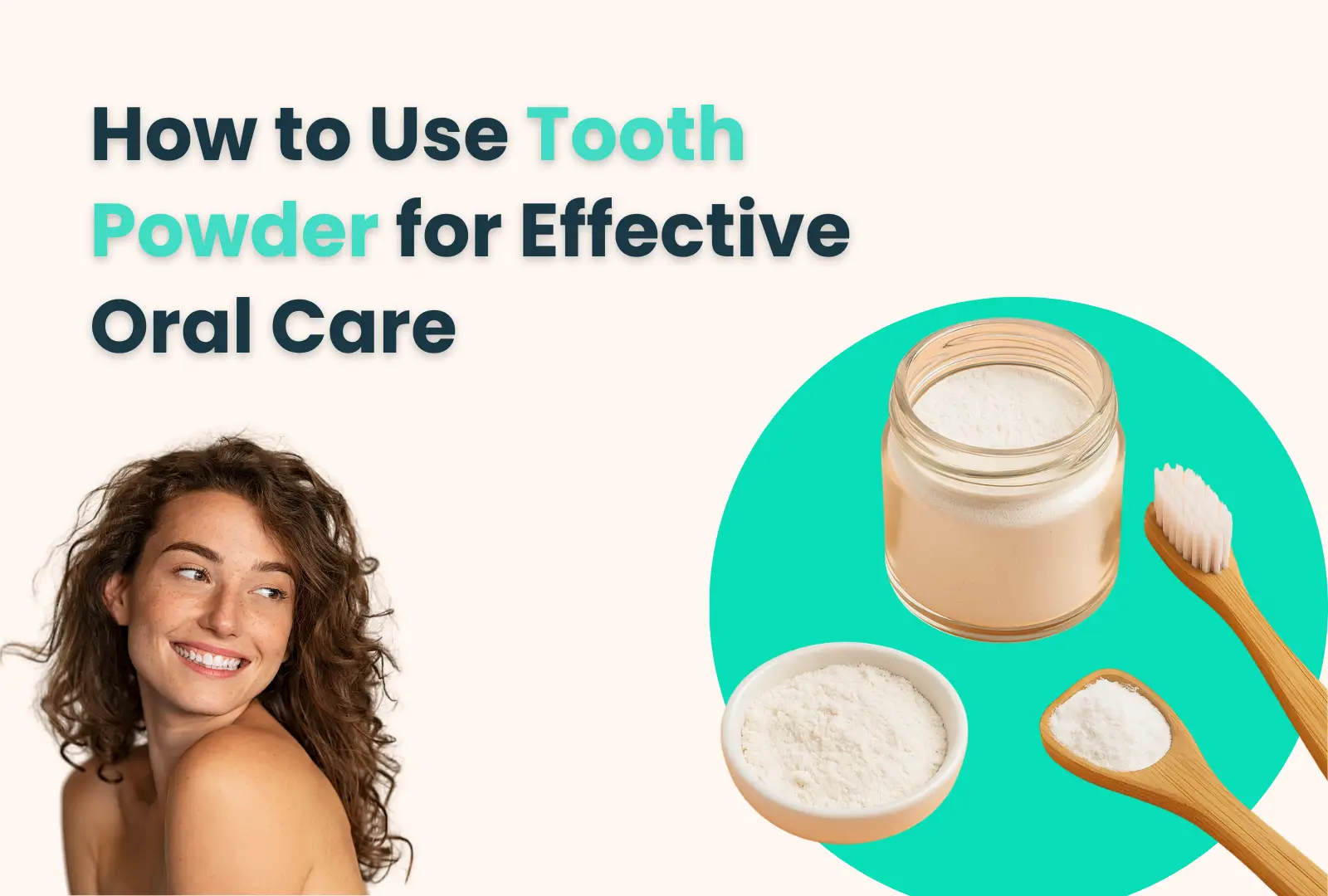Tooth powder is a natural alternative to traditional toothpaste that’s gaining popularity for its simplicity and effectiveness. But how to use tooth powder? Unlike conventional toothpaste, which is often filled with chemicals and artificial ingredients, tooth powder typically contains natural substances like baking soda, calcium carbonate, and essential oils. These ingredients work together to clean your teeth, freshen your breath, and even help with whitening.
If you’re looking to move away from harsh chemicals, tooth powder may be the right choice for you. It’s not only a gentler option for your teeth and gums but also a more eco-friendly and sustainable product. In this guide, we’ll show you exactly how to use tooth powder effectively and explain why it might be the best choice for your oral care routine.

| Key Takeaways Tooth powder is a natural, chemical-free alternative to toothpaste, made with ingredients like baking soda and calcium carbonate. It effectively removes plaque, whitens teeth, and controls tartar without being overly abrasive. Research shows that natural tooth powder has antimicrobial and antioxidant properties, supporting oral health. Tooth powder is gentler on sensitive teeth but should be used in moderation to avoid enamel wear. It’s an eco-friendly, sustainable option compared to traditional toothpaste, with fewer chemicals and minimal packaging. |
How Tooth Powder Works
To understand how tooth powder works, it’s essential to know the ingredients typically found in it. Common ingredients like baking soda, calcium carbonate, and essential oils each serve specific roles in maintaining your oral health. Baking soda acts as a mild abrasive, helping to remove plaque and stains without damaging enamel. Calcium carbonate is another key ingredient, known for its ability to remineralize the teeth and restore vital minerals that may be lost due to acidity. Essential oils such as peppermint or tea tree oil not only offer a refreshing taste but also provide antibacterial properties to help fight harmful bacteria in the mouth.
So, does tooth powder work as effectively as traditional toothpaste? The answer is yes, especially when used correctly. The abrasiveness of tooth powder is gentle yet effective, helping to clean the teeth without causing excessive wear. When applied properly, it helps remove plaque, freshen breath, and even brighten your smile—all without the added chemicals found in commercial toothpaste.
Recent research supports the effectiveness of tooth powder. A study published in the Journal of Ayurveda and Holistic Medicine examined a custom-made natural tooth powder and found it to have both antimicrobial and antioxidant properties. The study concluded that the natural tooth powder was effective in maintaining oral hygiene and could serve as an alternative to commercially available products. The findings support the idea that natural tooth powder is not only a viable option for oral health maintenance but could also be a novel approach in the field of dentistry in the era of ‘back to the basics.’
Tooth Powder vs. Toothpaste
| Aspect | Tooth Powder | Toothpaste |
| Ingredients | Typically made with natural ingredients like baking soda, calcium carbonate, essential oils, and herbs. | Often contains fluoride, abrasives, detergents, and preservatives. Some may have artificial flavors or colors. |
| Whitening | Gently whitens teeth using natural abrasives without harsh chemicals. | Whitening agents are often stronger but may contain chemicals like hydrogen peroxide. |
| Plaque Removal | Effective at removing plaque with mild abrasives. | Also removes plaque but may contain stronger abrasives that could cause enamel wear over time. |
| Sensitivity | Gentler on sensitive teeth due to natural ingredients. | Some toothpaste brands cater to sensitivity, while others may aggravate it with stronger chemicals. |
| Antibacterial Effects | Natural antibacterial properties from essential oils (e.g., tea tree, peppermint). | Many toothpastes contain antibacterial agents like triclosan or fluoride. |
| Flavor | Flavor is usually derived from natural essential oils. | Artificial flavors and sweeteners are common, sometimes causing irritation. |
| Tartar Control | Can help prevent tartar buildup with regular use. | Most toothpastes claim to help with tartar control through chemical agents. |
| Overall Effectiveness | Effective for those preferring a natural, minimalistic approach to oral care. | Proven effectiveness, especially for cavity prevention and gum health due to fluoride. |

Step-by-Step Guide: How to Use Tooth Powder
Using tooth powder may feel a bit different compared to traditional toothpaste, but once you get the hang of it, the process is simple and effective. Here’s a straightforward guide on how to use tooth powder properly:
Preparing for Use: What You’ll Need
To get started, you’ll need a few basic tools:
- A toothbrush (preferably one with soft bristles to avoid irritation)
- Tooth powder (this can be purchased in a container or loose powder form)
- A small container (optional, to hold the powder if you’re using loose powder)
The Correct Technique
- Apply the Tooth Powder: Dip your toothbrush into the tooth powder, or shake a small amount onto the bristles. Be sure to apply only a small amount—about the size of a pea—to avoid excess powder.
- Brush Gently: Gently brush your teeth in small circles for about 2 minutes. Avoid brushing too hard, as tooth powder is mildly abrasive, and excessive force could cause gum irritation.
- Rinse Thoroughly: After brushing, rinse your mouth thoroughly with water to remove any leftover powder. Make sure there’s no residue left in your mouth.
How Often Should You Use Tooth Powder?
While tooth powder is gentle, it’s essential to use it correctly. For most people, using tooth powder once or twice a day is sufficient. Avoid overuse, as its mild abrasiveness could wear down enamel if used too frequently.

Benefits of Tooth Powder
There are several reasons why many people are making the switch to tooth powder. Below are some of the key benefits that come with using this natural alternative to traditional toothpaste:
Natural Ingredients and Oral Health
One of the main advantages of tooth powder is that it’s made from natural ingredients, which means fewer chemicals in your oral care routine. Ingredients like baking soda and calcium carbonate are gentle on your gums and teeth, making them a great option for those with sensitive teeth or a preference for eco-friendly products. The natural components help clean the teeth without the harsh chemicals found in many conventional toothpastes.
Whitening and Stain Removal
Tooth powder can help with whitening and stain removal, thanks to its mild abrasiveness. Unlike some whitening toothpastes that rely on chemical bleaching agents, tooth powder uses natural abrasives to gently remove surface stains. Over time, you may notice a brighter, whiter smile without any harsh ingredients or sensitivities.
Plaque and Tartar Control
Another major benefit of tooth powder is its ability to help control plaque and prevent tartar buildup. The cleaning action of tooth powder removes food particles and plaque that can accumulate on your teeth throughout the day. Using tooth powder regularly can help maintain a cleaner, healthier mouth.
Less Risk of Sensitivity
If you have sensitive teeth, you may find tooth powder to be a gentler option compared to regular toothpaste. While some toothpaste brands can be abrasive or contain ingredients that trigger sensitivity, tooth powder offers a gentler way to clean your teeth and gums while still achieving effective results.
| Is Tooth Powder Too Abrasive? Many believe that tooth powder is too harsh on teeth, but in reality, it’s designed to be gentle while still providing an effective clean. The abrasiveness level depends on the ingredients used, and when applied correctly, tooth powder can be just as safe as regular toothpaste. To avoid excessive abrasiveness, it’s important to: Use a soft-bristled toothbrush.Apply only a small amount of tooth powder—a little goes a long way.Brush gently in circular motions, rather than scrubbing forcefully. |
If you’re considering making the switch to tooth powder or have any concerns about your oral health, it’s always best to consult with a professional. Book an appointment with your dentist today to discuss the best oral care practices for your teeth and gums. Healthy teeth start with the right care—schedule your visit now!
Frequently Asked Questions
What are the downsides of using tooth powder?
While tooth powder has many benefits, there are a few potential downsides to consider. If used too often or with excessive force, its abrasiveness could cause enamel wear. It’s essential to use it gently and not overuse it to avoid any adverse effects.
How long should you leave tooth whitening powder on your teeth?
You should not leave tooth whitening powder on your teeth for extended periods. Typically, brushing with tooth powder for 2 minutes is enough to achieve a clean and fresh mouth. Avoid leaving the powder on your teeth for too long, as it can be abrasive.
Do dentists recommend using tooth powder?
Many dentists support the idea of tooth powder as a safe and natural alternative to toothpaste, especially when made with gentle ingredients. However, it’s always best to consult your dentist to see if it’s a suitable option for your specific dental needs.
Can tooth powder help remove tartar?
Yes, tooth powder can help with tartar removal. Its abrasive ingredients, like calcium carbonate and baking soda, can scrub away plaque that may harden into tartar. Regular use can reduce tartar buildup, though professional dental cleanings are necessary for heavy tartar removal.
What is the best tooth powder?
The best tooth powder depends on your personal preferences and needs. Look for options with natural ingredients such as baking soda, calcium carbonate, and essential oils. Always choose a product that suits your specific oral health needs, whether it’s whitening, plaque control, or sensitivity protection.
